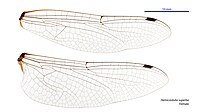Hemicordulia superba
Appearance
| Superb emerald | |
|---|---|
| Scientific classification | |
| Domain: | Eukaryota |
| Kingdom: | Animalia |
| Phylum: | Arthropoda |
| Class: | Insecta |
| Order: | Odonata |
| Infraorder: | Anisoptera |
| Family: | Corduliidae |
| Genus: | Hemicordulia |
| Species: | H. superba
|
| Binomial name | |
| Hemicordulia superba | |

| |
Hemicordulia superba is a species of dragonfly in the family Corduliidae,[3] known as the superb emerald.[4] It inhabits rivers, pools and lakes in south-eastern Queensland and northern New South Wales in Australia.[5]
Hemicordulia superba is a small to medium-sized, black and yellow dragonfly with long legs. In both males and females the inboard edge of the hindwing is rounded.[6]
Gallery
-
Female wings
-
Male wings
See also
References
Wikimedia Commons has media related to Hemicordulia superba.
- ^ Dow, R.A. (2017). "Hemicordulia superba". IUCN Red List of Threatened Species. 2017: e.T87533825A87534101. doi:10.2305/IUCN.UK.2017-1.RLTS.T87533825A87534101.en. Retrieved 20 November 2021.
- ^ Tillyard, R.J. (1911). "Further notes on some rare Australian Corduliinae, with descriptions of new species". Proceedings of the Linnean Society of New South Wales. 36: 366–387 [368]. doi:10.5962/bhl.part.21904 – via Biodiversity Heritage Library.
- ^ "Species Hemicordulia superba Watson, 1969". Australian Faunal Directory. Australian Biological Resources Study. 2012. Retrieved 6 February 2017.
- ^ Theischinger, Günther; Hawking, John (2006). The Complete Field Guide to Dragonflies of Australia. Collingwood, Victoria, Australia: CSIRO Publishing. p. 248. ISBN 978-0-64309-073-6.
- ^ Theischinger, Gunther; Endersby, Ian (2009). Identification Guide to the Australian Odonata. Department of Environment, Climate Change and Water NSW. p. 218. ISBN 978-1-74232-475-3.
- ^ Watson, J.A.L.; Theischinger, G.; Abbey, H.M. (1991). The Australian Dragonflies: A Guide to the Identification, Distributions and Habitats of Australian Odonata. Melbourne: CSIRO. ISBN 0643051368.



